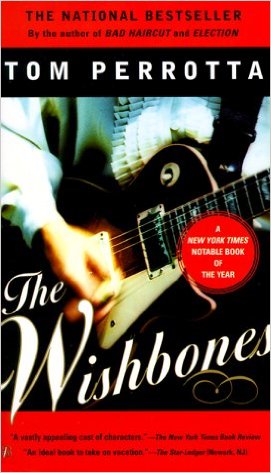Novel Endings: Perrotta’s The Wishbones, Grimsley’s Boulevard vs. Mystery Endings
10/20/15 NOVEL ENDINGS I don’t think this can be a spoiler because I can’t remember the name of the book or the author. It’s set in small-town Minnesota in the fall, and the protagonist teaches school. I liked it and sent it home with a friend who came for the weekend. He taught high school in New York City. The teaching year had just begun, and he was in his usual back-to-school funk. I thought he’d enjoy reading about a fellow high school teacher in a book set at the beginning of the academic year. “Thanks a lot,” he said sarcastically in our next phone conversation.
I hadn’t considered the fact that the teacher was shot dead in the end of the book. Was his killer a student? Maybe a former student? I don’t remember. My teacher friend found it demoralizing.
I smile remembering his reaction. I suppose there was something psychologically slapstick in my recommendation.
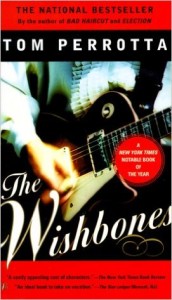 It’s difficult to write about how books end without spoiling them for readers. One of the best book endings I know is that of Tom Perrotta’s novel The Wishbones. But not a word more about it from me; you have to read it for yourself to appreciate it.
It’s difficult to write about how books end without spoiling them for readers. One of the best book endings I know is that of Tom Perrotta’s novel The Wishbones. But not a word more about it from me; you have to read it for yourself to appreciate it.
As I’ve said before here on LLNB, every Anne Tyler book—each one a character study—has, for me, a perfect ending in the sense that I don’t know what’s coming until I read the last page. Many character studies—my favorite kind of fiction—in a sense simply dribble off at the end, which is fine, too. A character study doesn’t need to do more than take the character through an experience, mild or dramatic, and leave him on the other side. 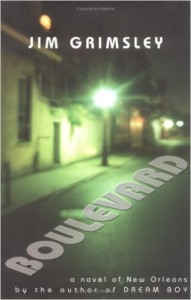 Try, for example, Jim Grimsley’s novella Boulevard, about life in 1970s New Orleans when you’re too young;
Try, for example, Jim Grimsley’s novella Boulevard, about life in 1970s New Orleans when you’re too young; 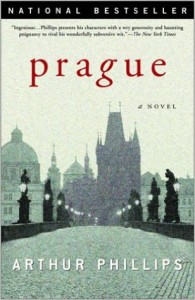 Arthur Phillips’ novel Prague, about enterprising 20s ex-pats in post-Communism Budapest; or Paul Murray’s humorous An Evening of Long Goodbyes (“How’s a person supposed to live in a country where it rains all the time?”)
Arthur Phillips’ novel Prague, about enterprising 20s ex-pats in post-Communism Budapest; or Paul Murray’s humorous An Evening of Long Goodbyes (“How’s a person supposed to live in a country where it rains all the time?”)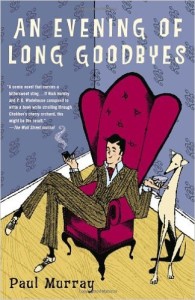 . Every now and then I think an author goes too far, tries to wrap up things too neatly. This is more apt to happen with plot-driven fiction. Ann Patchett’s beautiful, enthralling Bel Canto, where the characters are held hostage in a Latin American vice-presidential residence, didn’t need as much ending as she provided. But that’s just one man’s opinion, of course.
. Every now and then I think an author goes too far, tries to wrap up things too neatly. This is more apt to happen with plot-driven fiction. Ann Patchett’s beautiful, enthralling Bel Canto, where the characters are held hostage in a Latin American vice-presidential residence, didn’t need as much ending as she provided. But that’s just one man’s opinion, of course.
Most mysteries have forgettable, somewhat disappointing endings. Who really cares who did it? If I’m enjoying the mystery, it’s a letdown to have it solved. There are exceptions: the sleight of hand employed by Scott Turrow in Presumed Innocent left me agape. How could I not have known? I asked myself. Patricia Highsmith’s The Talented Mr. Ripley also ends memorably. If you like cruises, read James M. Cain’s Double Indemnity for a wrap-up to savor while you’re at sea.
Then there are mysteries that begin like Ernesto Sabato’s novella The Tunnel: “It should be sufficient to say that I am Juan Pablo Castel, the painter who killed Maria Iribarne.” If you can’t see where this one’s going, you need to turn in both your amateur sleuth badge and your amateur psychologist certificate. The Tunnel, like Gabriel Garcia Marquiz’ novella Chronicle of a Death Foretold, is a why-it-happened, not a who-dunnit. A good why-it-happened can keep you on the edge of your seat waiting for the it of the book.
Which brings me back to the teacher being shot to death in the end. Over the years I lost touch with my teacher friend. Or maybe he lost touch with me because he didn’t like the books I recommended.
Gary Garth McCann
First-prize winner for short works and for suspense/mystery, Maryland Writers’ Association, Gary Garth McCann is the author of the novella Young and in Love? and of the novels The Shape of the Earth and The Man Who Asked To Be Killed, praised at the Washington Independent Review of Books. His most recent published stories are available online in Chelsea Station Magazine, Erotic Review Magazine, and in Mobius: The Journal of Social Change. His other stories appear in The Q Review, reprinted in Off the Rocks, in Best Gay Love Stories 2005, and in the Harrington Gay Men’s Fiction Quarterly. See his blogs at garygarthmccann.com and streamlinermemories.com.
- Web |
- More Posts(57)
